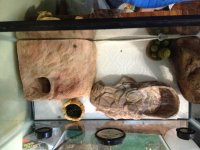MommyShanna
New member
I'm new to geckos as well as this forum. I'm hoping to find some help for my son's beloved geckos when there isnt much to be had locally.
A few months ago, my son got two leopard geckos. All was well, and they were gaining weight nicely. On April 27th, I made the mistake of purchasing 2 more from a different pet store. All appeared well for about a week when one stopped eating. After watching it lose weight steadily, I contacted the store, and they admitted they had two sick geckos they had pulled from their display with similar symptoms. It was suggested that they might need more calcium and recommended that I calcium coat every meal. It's very hard to get calcium into a gecko who is refusing meals :-/
After another week went by and the poor thing had only eaten 2 crickets, I took it to the vet. Our local vets aren't big on exotic animals and really didn't have much advice to offer. After the vet helped to get the last of the retained shed off its feet, I was told the gecko was underweight (well no surprise there!) and given carnivore care to poke at it 3-4 times a day. They could not find any parasites in the stool sample. The vet did not think I needed to quarantine the sick gecko, but recommended cleaning everything with bleach. The poor thing does not enjoy the syringe feelings, and I'm barely getting half a feed into its belly a day.
I stopped in at my preferred local pet store this past week asking for advice from their reptile guy about foods that might tempt a sick gecko... After a brief discussion of symptoms, he said it sounded like crypto and told me to google it. Now I'm just scared. There are so many illnesses on the World Wide Web, I don't know what to think! I have isolated the sick one, but I'm sure it was too late to prevent spread of any communicable disease. I also picked up an ammonia based cleaning spray along with meal worms, wax worms, and pellets... I saw evidence of regurgitated wax worm the next morning. 5 mealworms disappeared the next day.
I've continued to offer the carnivore care, but now I have the other newer gecko losing weight and both of the older ones ignored the crickets I put in tonight. One odd thing I've noticed is they all want to lick the water drops off the glass when I spray their moss down. Their tongues look redder than normal... Not sure if that means anything...
If my vet knows nothing, and there is no other vet that even pretends to treat "exotic animals" then what can I do? I'm utterly overwhelmed by possibilities on google. How can I help these little critters?
A few months ago, my son got two leopard geckos. All was well, and they were gaining weight nicely. On April 27th, I made the mistake of purchasing 2 more from a different pet store. All appeared well for about a week when one stopped eating. After watching it lose weight steadily, I contacted the store, and they admitted they had two sick geckos they had pulled from their display with similar symptoms. It was suggested that they might need more calcium and recommended that I calcium coat every meal. It's very hard to get calcium into a gecko who is refusing meals :-/
After another week went by and the poor thing had only eaten 2 crickets, I took it to the vet. Our local vets aren't big on exotic animals and really didn't have much advice to offer. After the vet helped to get the last of the retained shed off its feet, I was told the gecko was underweight (well no surprise there!) and given carnivore care to poke at it 3-4 times a day. They could not find any parasites in the stool sample. The vet did not think I needed to quarantine the sick gecko, but recommended cleaning everything with bleach. The poor thing does not enjoy the syringe feelings, and I'm barely getting half a feed into its belly a day.
I stopped in at my preferred local pet store this past week asking for advice from their reptile guy about foods that might tempt a sick gecko... After a brief discussion of symptoms, he said it sounded like crypto and told me to google it. Now I'm just scared. There are so many illnesses on the World Wide Web, I don't know what to think! I have isolated the sick one, but I'm sure it was too late to prevent spread of any communicable disease. I also picked up an ammonia based cleaning spray along with meal worms, wax worms, and pellets... I saw evidence of regurgitated wax worm the next morning. 5 mealworms disappeared the next day.
I've continued to offer the carnivore care, but now I have the other newer gecko losing weight and both of the older ones ignored the crickets I put in tonight. One odd thing I've noticed is they all want to lick the water drops off the glass when I spray their moss down. Their tongues look redder than normal... Not sure if that means anything...
If my vet knows nothing, and there is no other vet that even pretends to treat "exotic animals" then what can I do? I'm utterly overwhelmed by possibilities on google. How can I help these little critters?







